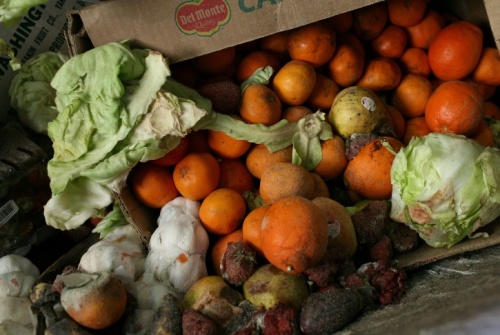What happens when a politician attempts to tackle food waste? Well, if you are a politician in Great Britain, you get rotten tomatoes tossed your way.
In fact, when Environment minister Richard Benyon claimed that Britons were wasting about £50 GBP (or about $77 USD) a week, he kicked up quite the storm.
- The Telegraph, dug up a photo of Benyon handing out bread to the poor.
- The Prime Minister admitted that Benyon’s comments “did not look good.”
- The Daily Mail points out that when Benyon, Britain’s richest MP, tells people to stop wasting food, he is more like Marie Antoinette than a concerned environmentalist.
- The Mirror thought his comments seemed superficial and disconnected from the real reasons for the growing food waste problem.
For a while I felt like I was reading celebrity gossip and not news about ways to approach the complex issue of solving our food waste issues. And then The Guardian publishes “Should it brie in the bin?” which attempts to look at the numbers and explain how food waste is a problem in a nation facing severe austerity.
Here in the United States, Liz Neumark summarized what she learned at the National Food Policy Conference in Washington DC. She shares some new numbers on food waste in the nation:
- 1 in 4 Americans need government food or nutrition assistance program.
- 68% of food-insecure families have at least one adult working full-time.
- About 30-40 percent of what travels from farm on the way to the fork becomes food waste. That is over 65 billion pounds of food a year according to the EPA.
And finally, there were two articles with nice tips and strategies for helping individuals reduce the amount of food they waste. First, “Having a meal plan— and sticking to it — can cut waste and your waist” in the Calgary Herald makes the case for more discipline in shopping and cooking. Second, Care2.com recommends a FIFO (First In, First Out) approach to food in your fridge.







 There was a lot of coverage on food waste again this week, mostly inspired by the UN’s
There was a lot of coverage on food waste again this week, mostly inspired by the UN’s 
 You may have noticed that I don’t post a weekend roundup every week. When I don’t post, it’s usually because I haven’t found enough articles or videos that have something new to say about food-waste-related issues. Most of this week’s articles are ones that I wouldn’t usually post, but what I found interesting this week was the sheer number of articles that have been published on the topic. In my
You may have noticed that I don’t post a weekend roundup every week. When I don’t post, it’s usually because I haven’t found enough articles or videos that have something new to say about food-waste-related issues. Most of this week’s articles are ones that I wouldn’t usually post, but what I found interesting this week was the sheer number of articles that have been published on the topic. In my 